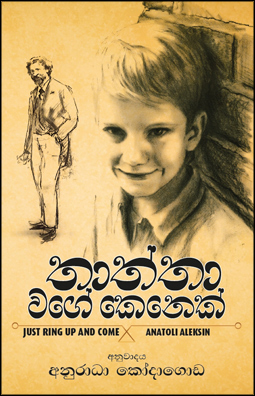|
BOOK REVIEW:
An ode to Dad
Book Thaththa wage kenek
Written by Anatoly Alexin
Translated by Anuradha Kodagoda
Reviewed by Dimithri Wijesinghe
|

Anuradha Kodagoda |
‘Thaththa wage kenek’ is a Sinhala translation of a beautiful extract
from ‘Soviet Literature’, originally titled ‘Just Ring Up and Come’
written by Anatoly Alexin, whose more famous works include the book
‘Secret of the Yellow House’. He was also featured in the premiere
edition of 500 greatest geniuses of the 21st century.
This is a maiden attempt at a translation by former Sunday Observer
staffer Anuradha Kodagoda, who has however done a brilliant job in
capturing the deeper nuances of the story. That the author feels deeply
for the story is clearly visible in her sensitive approach and the
writing style. Given that Anuradha lost her own mother at a young age
and was brought up by her father, the story is clearly dear to her heart
and the sincerity drips off of the pages.
The story is split into seven chapters and we essentially follow the
smartest pre-teen you would ever encounter in a documented portion of
his surprisingly entertaining life. Initially, the young protagonist of
no more than 13 years appears as a naïve little boy who is hell-bent to
help his surgeon father reclaim his rightful place in the household,
especially in the eyes of his mother whose ex-lover of unknown time span
has made a sudden re-appearance in their lives.
The hero is on a mission to restore his father’s honour and he will
stop at nothing. However, what is most beautiful about the story as a
whole is the truthfulness of a child’s innocence. A child’s mind is
pure, it is untainted and its purity is absolutely beautiful and
Anuradha has captured its essence perfectly.
As someone who is relatively new to Soviet short stories in general,
personally, I did have several issues with its archaic nature and the
patriarchal societal roles adopted. Seeing them freely accepted did irk
my inner feminist. However, since the story is a piece written in the
70s and is a victim of its time, I can forgive it. It is simply the
nature of the story.
 The
best thing about the story is of course its subtle humour that is
innocent and beautiful, just like its young protagonist. The origins of
the thoughts of a young boy who is not yet a man but is no longer a
child is fascinating, though at times one could mistake certain innocent
inquiries as sarcastic statements far beyond the abilities of a
thirteen-year-old boy. This is however more or less a product of our
jaded minds and it truly cannot be attributed as something the
translator could have done. The
best thing about the story is of course its subtle humour that is
innocent and beautiful, just like its young protagonist. The origins of
the thoughts of a young boy who is not yet a man but is no longer a
child is fascinating, though at times one could mistake certain innocent
inquiries as sarcastic statements far beyond the abilities of a
thirteen-year-old boy. This is however more or less a product of our
jaded minds and it truly cannot be attributed as something the
translator could have done.
However, despite what was said before, the humour of the story is on
point, in many an instance the reader would stop to marvel at how most
things, which would have otherwise been lost in translation, has made it
to this version. And it just adds to the overall experience of the
enjoyment of a brilliant novel.
One of the stars of the entire story is the protagonist’s
grandmother, who is by far the most relatable character, mostly due to
her cryptic tone, which she adopts, not unlike our local grandmothers.
She is a typical elderly lady who is humorous to no end and our little
heroe’s interpretation of her subtle (not really) suggestions are gold!
As an avid reader and as someone who easily gets emotionally attached
to the characters they read, I would like to extend a personal thank you
to the translator for having done a positively enormous job in bringing
the innocence of a child in a far away land to paper and making it
infinitely relatable. ‘Thaththa wage kenek’ is an absolute joy to read
and the translator’s job has never been done better, and the only
complaint that the reader would have is that it simply ends too soon!
Anuradha Kodagoda a journalist by profession and a short filmmaker.
‘Thaththa Wage Kenek’ is her first translation. |

